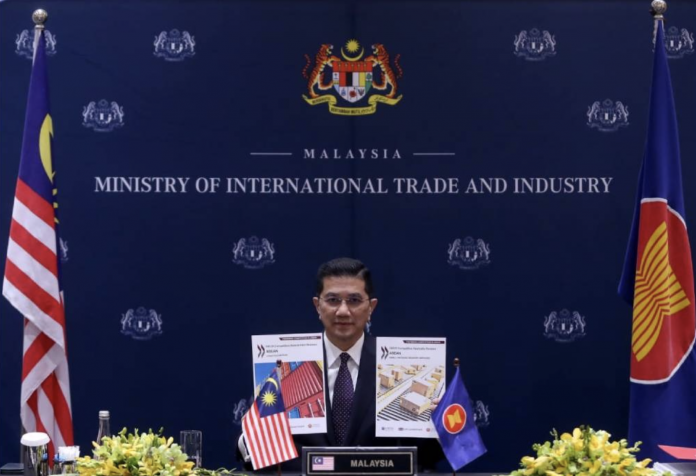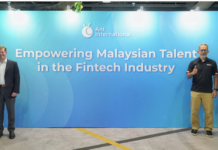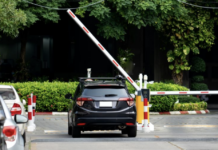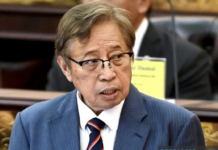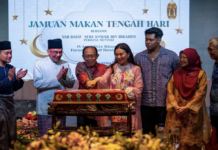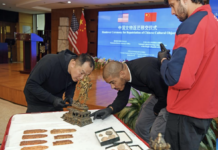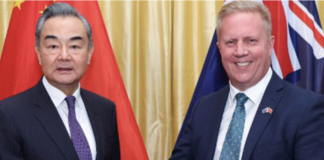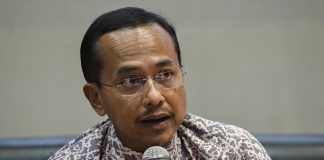KUALA LUMPUR, Sept 11 — The 53rd ASEAN Economic Ministers’ (AEM) Meeting and Related Meetings concluded on a positive note for the revitalisation of regional economic growth and the importance of ASEAN centrality and commitment to work collectively and emerge from the COVID-19 crisis successfully.
To rejuvenate the region’s economy, discussions on the implementation status under the ASEAN Comprehensive Recovery Framework (ACRF) took centre stage, the Ministry of International Trade and Industry (MITI) said in a statement here today.
Among key initiatives under the ACRF that have been completed were the signing of the Regional Comprehensive Economic Partnership (RCEP) Agreement, the finalisation of the comprehensive review of the ASEAN Digital Integration Framework, and the ASEAN Digital Integration Framework Action Plan (DIFAP) 2019-2025, it said at the end of the virtual meeting held between Sept 8-9, 2021.
Senior Minister and MITI Minister Datuk Seri Mohamed Azmin Ali led the Malaysian delegation at the AEM Meeting hosted by Brunei Darussalam as the Chair of ASEAN 2021.
In the meeting, Azmin stressed the imperative of ASEAN centrality and the need to continue to work with greater resolve in order to tackle headlong the challenges of the pandemic for the region to emerge stronger and more resilient. He further underscored the importance of expediting the implementation of all the initiatives under ACRF to facilitate economic reopening and spur regional recovery.
The AEM also welcomed the finalisation of the ‘Bandar Seri Begawan Roadmap: An ASEAN Digital Transformation Agenda to Accelerate ASEAN’s Economic Recovery and Digital Economy Integration (BSBR)’, which will provide a focused plan for ASEAN to develop an enabling environment for a robust ASEAN digital economy and ensure the region emerges stronger from the pandemic.
In supporting the roadmap and calling for its swift implementation, the Senior Minister said that it is timely to tackle the immediate and short-term needs for the digital transformation of the region.
He reiterated Malaysia’s commitment to incorporate comprehensive digital economy elements in international trade arrangements and cooperation so as to create a digital trade environment with improved stability, lower risks, and reduced compliance costs.
The initiative complements Malaysia’s MyDIGITAL that outlines strategies to drive the growth of the digital economy and narrow the digital divide as well as to transform the nation into a digitally-enabled and technology-driven high-income economy.
The ministers endorsed the Framework for Circular Economy for the ASEAN Economic Community in recognising the importance of advancing sustainable economic agenda.
Azmin also emphasised that the Environment, Social and Governance (ESG) factors are central to the key elements in the ASEAN Community Vision 2025, and are crucial in driving long-term value creation, integrating Malaysia’s businesses into international networks and attracting more investors.
In this vein, the Senior Minister proposed the concept of Carbon Neutrality for ASEAN and explore discussions on investment opportunities in the green economy which was warmly received by fellow ministers and endorsed by AEM Chair Dato Amin Liew Abdullah.
Going forward, ASEAN Secretariat Chair Lim Jock Hoi also expressed interest to work with Malaysia on advancing this initiative and deepening the commitment towards sustainability and green technology.
The AEM commenced with the ASEAN Free Trade Area (AFTA) Council Meeting where the ministers were apprised of the status of the implementation of the ASEAN Trade in Goods Agreement (ATIGA) as well as its review.
Achievements in trade facilitative measures were also reported, including the endorsement of the Non-Tariff Measures (NTM) Cost-Effectiveness Toolkit, which would act as an important guideline to address NTMs that affect the smooth flow of goods in ASEAN.
This was followed by the ASEAN Investment Area (AIA) Council Meeting where the ministers adopted, in principle, the ASEAN Investment Facilitation Framework (AIFF), underscoring the importance of improving investment facilitation processes in ASEAN member states, which are crucial for promoting and retaining investments in the region and contributing to overall economic recovery.
The meeting also commended the work advanced by the ASEAN Business Advisory Council (ASEAN-BAC) in 2021 in boosting ASEAN’s efforts towards economic integration and continuously championing initiatives that are central to the betterment of the business environment and the people of ASEAN.
To this end, the ministers welcomed the recommendations of the ASEAN-BAC on human capital development, trade facilitation, and digital connectivity.
The ministers also endorsed the expanded list of essential goods in the memorandum of understanding (MoU) on the Implementation of Non-Tariff Measures on Essential Goods, signed in November 2020, to ensure the uninterrupted flow of essential goods in the region. The list now includes food and agricultural products, from the previously endorsed list of medicines and medical equipment.
They also launched the OECD Competition Assessment and Competitive Neutrality Reports on the logistics sector in ASEAN.
Funded by the ASEAN-UK Economic Reform Programme, these two studies aim at assessing regulatory constraints on competition in the logistic sectors in all ASEAN member states by identifying regulations that hinder the efficient functioning of markets and creating a non-level playing field for businesses.




